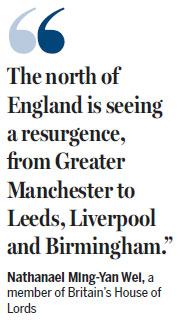Mutual benefits lie in Sino-UK partnerships
By Cecily Liu (China Daily) Updated: 2015-03-02 07:38Chinese urged to trade, invest particularly in North England

The business relationship between the United Kingdom and China will continue to strengthen as Chinese firms seek to diversify their asset base globally, said Nathanael Ming-Yan Wei, a prominent social entrepreneur and the only active Chinese peer in Britain's House of Lords.
"Chinese trade and investment are key to help the UK make the most of its own recovery as the fastest-growing advanced economy in the Western world," Wei said.
"It not only opens up new market opportunities for firms both in China and the UK, but will help each side become more productive as brands are internationalized and strengthened, and as new investment rejuvenates the supply chains involved with new technology and ideas," he said.
Since entering the House of Lords in 2010 Wei has led business delegations from the UK to China to help cement bilateral business relations. Last year he led a healthcare delegation of 10 UK businesses and organizations to Beijing, Tianjin, Shanghai, Changzhou, Chengdu, Zhengzhou and Huai'an in Jiangsu province.
Wei also helped to build regional links between China and Manchester, a city in northwest England. Wei was commissioned to write a report on how Manchester can best engage with China, which was published in 2012.
The Wei report suggested some approaches including the establishment of a Manchester-China Forum. The local government considered it a good idea and subsequently appointed Charlie Cornish of Manchester Airport City to be its chair.
Wei said that north England has great potential to host Chinese investment and business expansions because there is tremendous value in the region due to the availability of land and more affordable quality of living. He said as cities away from London start to receive more devolved powers they would develop more imaginative ideas for investment with incoming investors.
"The north of England is seeing a resurgence, from Greater Manchester to Leeds, Liverpool and Birmingham," Wei said.
Wei said he was particularly excited to see the development of trade between the UK and China, which he believes can build world-class companies that go global.
"The key will be for business leaders on both sides to take a strategic approach and integrate both Chinese and British culture and talent at all levels whether based in the UK or in China," he said.
As the son of Hong Kong-born parents who immigrated to Britain, Wei is also very active in the British Chinese community and hopes to help ethnic Chinese candidates stand for the British election this year.
"As long as Chinese in the UK are eligible to vote, register and turn out, we will be able to demonstrate that in a good number of seats the Chinese vote can affect the outcome locally and therefore has a real voice and right to be heard," Wei said.
Wei first visited China in the mid 1990s crossing over to Shenzhen from Hong Kong. Over the years he has witnessed tremendous changes in the country.
"I could sense China's energy, ambition and desire to transform itself into what we have come to know so well around the world today. Today China is more prosperous, more aware of its need to steward its environment and highly skilled and advanced," he said.
Visiting China in late 2014, he noticed the sustainable growth of many Chinese cities, with a greater focus on the needs of citizens in relation to improving healthcare, education and the natural environment.
"I very much welcome this - it is a shift that we in the UK also have had to undergo and there is much to learn from comparing our respective experiences, and ultimately sharing solutions and innovations that will arise out of this focus on sustainability," he said.




